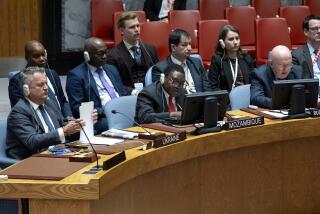East-West Split Shows at Moscow Rights Session
- Share via
MOSCOW — The Soviet-sanctioned Social Committee for Human Rights held its first open meeting Wednesday, and East-West differences came immediately to the surface.
A Western delegation, from the International Helsinki Federation for Human Rights, was on hand to discuss the sensitive topic of Soviet compliance with the Helsinki accords of 1975 on emigration and political liberties.
Also present were Soviet citizens with grievances against the state, among them refuseniks and members of the Hare Krishna sect who complain that they are persecuted.
When Fyodor M. Burlatsky, chairman of the Soviet committee, called the meeting to order, members of the international group immediately insisted that a Soviet citizen, Lev Timofeyev, be permitted to sit with them. The request was granted.
But when they asked that Timofeyev--who has served two years in labor camps for anti-Soviet slander and now heads an informal group known as the Press Club Glasnost--be permitted to speak, it nearly broke up the meeting.
“Do you want a show and a scandal?” Burlatsky said. “We don’t know this group, its purposes or its platform. The committee is not prepared to deal with this.”
Karl Johannes von Schwarzenberg, an Austrian aristocrat who is chairman of the international delegation, said, “We are glad to hear different voices from our delegation and the Soviet delegation,” and then repeated the request that Timofeyev be given the floor.
Burlatsky suggested that the Press Club Glasnost, which takes its name from Soviet leader Mikhail S. Gorbachev’s policy of glasnost , or openness, has taken extreme positions. He also pointed out that it was not listed as a part of the international delegation.
Robert Bernstein, president of Random House, the publishers, and an international delegation member, leaped to his feet to protest.
“Press Club Glasnost is a new member of our group,” he said.
Burlatsky finally allowed Timofeyev to speak. Timofeyev noted that Burlatsky had not called him “comrade,” as is customary here, or “mister,” as in the West. “He called me just ‘Timofeyev,’ but I got used to that during two years of labor camp.”
Then he presented a list of 200 people he said are in prison because of their beliefs and cited resolutions adopted by a human rights conference he sponsored last month.
After getting down to business, Mikhail A. Krutogolov, a Soviet lawyer, said that 99% of the Soviet people are not concerned about the right to emigrate or the right to demonstrate in Red Square.
“What is essential,” he said, “is that the police don’t invade their homes and that they get housing on an equal and just basis.” People concerned with human rights, the lawyer went on, should think about the typical Soviet citizen living in a village 3,000 miles from Moscow.
More to Read
Sign up for Essential California
The most important California stories and recommendations in your inbox every morning.
You may occasionally receive promotional content from the Los Angeles Times.













